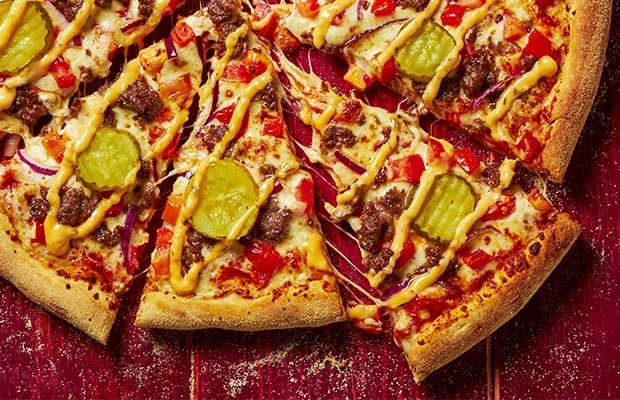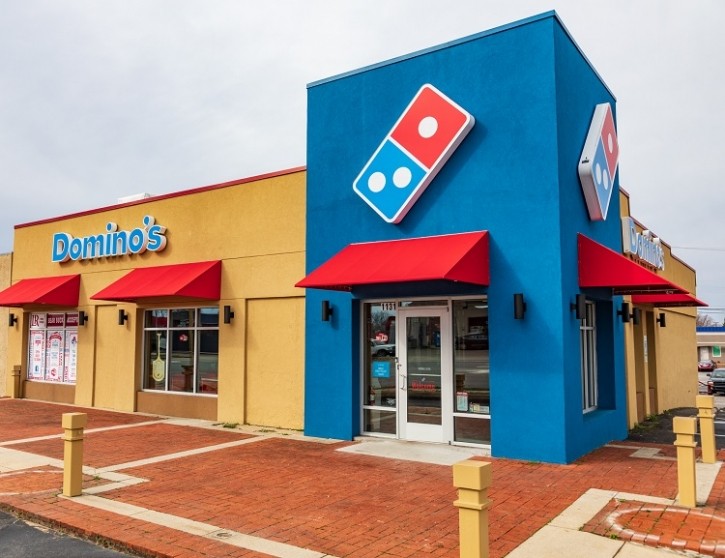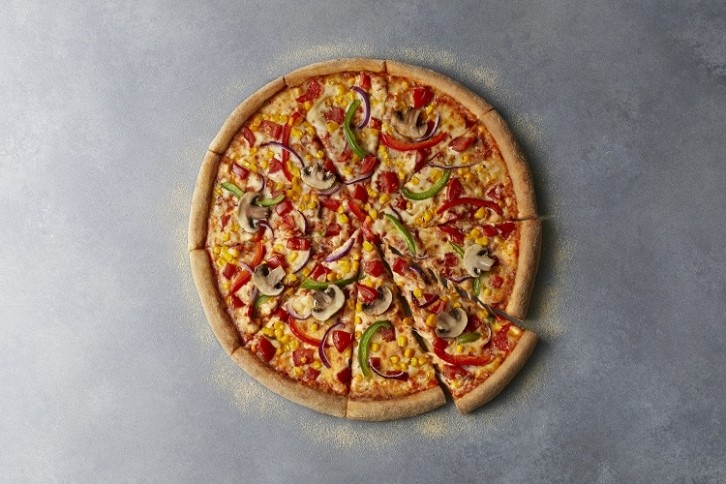Last month, Domino’s Pizza Group announced its famed Christmas pizza ‘The Festive One’ was returning to menus. The pizza is a far cry from the classic Margherita: while similarly topped with cheese and tomato, it is also covered in Christmas trimmings. These include pulled turkey breast marinaded in sage and onion, sausage, smoked bacon and onions, and a cranberry drizzle.
The invention was extremely well thought out, explained Louise Pilkington, who heads up innovation at the fast-food major. Cooked turkey can easily become dry, which risks becoming even drier in a pizza oven. But the chosen combination of toppings assures the turkey is in fact ‘really moist’. “A lot of detail goes into how to make each individual ingredient phenomenal.”
Finding solutions to these kinds of problems is part and parcel of Pilkington’s role at Domino’s, she told FoodNavigator. “My job is to develop food ideas that don’t just keep consumers coming back, but that also attract new customers.”
Innovating a tried-and-tested favourite
Pizza is one of the most-loved foods in the world, with research from food ordering company Foodhub suggesting it was the most popular takeaway in the UK last year.
For Domino’s, pizza is its bread and butter. Founded in 1960, the company has since grown into a fast-food major with 20,000 stores in more than 90 international markets. The company was an early pioneer in the made-to-order pizza delivery space, and has launched innovations over the years ranging from its ‘heatwave hot bags’ for better delivery to original pizza toppings such as ‘The Cheeseburger’.

So in the kitchen, how does the Domino’s innovation team go about thinking up new concepts and recipes? It all starts with consumer research. Pilkington said that both on and off the job, she ‘always’ has an eye on future food trends. “I love food and you couldn’t do this job if you didn’t love food.”
The innovation team partakes in food safaris to explore what’s ‘up and coming’ across the board, from high street restaurants to food markets.
At the same time, Pilkington and colleagues are ‘constantly’ talking to consumers, not just about the eating occasions that Domino’s may play a role in, but also eating occasions in which they don’t. “That can also highlight opportunities,” she explained.
Other recent innovations to land on Domino’s menus include the expansion of its loaded fries range with pizza toppings: Pepperoni Passion, Cheeseburger, and Double Bacon and Cheese.
Fries is understandably quite an ‘unusual’ addition to a pizza menu. The company already offered potato-based sides, but consumer insights suggested fries would be well received. “We did a lot of work with our supplier to try and get a crispy golden fry that would deliver.”
And it’s not all about just getting the product right. There was a lot of back-end work to ensure it delivers the right taste experience, portion size, and price point, Pilkington revealed.
Growing appetite for flavours that challenge the consumer
Pilkington heads up innovation for Domino’s Pizza UK & Ireland, where she has observed consumers are adventurous and excited about international flavours. This is especially the case in Britain, which doesn’t have its own distinct cuisine, we were told.
There’s been an ‘explosion’ in global cuisines, which have largely come from street food markets. “We did some research recently that looked at different food concepts, and observed those that were linked to global food were much more exciting and popular.”
A good example was The Ultimate Spicy Sausage pizza Domino’s launched in time for the 2022 FIFA World Cup. The offering was topped with tomato sauce, cheese, nduja sausage, salami and red jalapenos. At the time, nduja – a spicy, spreadable pork sausage from southern Italy – was a ‘relatively unknown’ ingredient, which is why the pizza company called it ‘Spicy Sausage’.
The pizza was a hit, the innovation lead recalled. “People are clamouring for that to come back.”

Another innovation turned to Mexico for inspiration. The Ultimate Chicken Mexicana pizza is topped with taco spiced pulled chicken, tomatoes, onions, green and red peppers, green jalapenos, tomato sauce and mozzarella. The pizza was inspired by soft shell tacos, Pilkington revealed. “That was our best-selling innovation for five years.
“So we’re seeing more and more appetite for new, different and exciting flavours that challenge the consumer. That’s what drives us on: that, coupled with a desire for slightly healthier choices.”
And it’s not all about pizza. Domino’s is expanding its side range and has been trialling other accompaniments like shakes. “We’ve been looking at how we might drive dessert sales…and also looking to things like wraps and Cheeky Little Pizzas [that are] perfect for lunch. [We’re investigating] how we can do more in that healthy eating, but also lighter for lunch, type of space. There is a lot of work coming.”
Spotlight on nutrition
Some of Domino’s innovations cater directly to more health-conscious consumers. The company has observed attitudes towards healthy food change over the years, and sees to serve those looking for healthy indulgence.
But that doesn’t mean its customers want to be told to eat a specific pizza because it has lower calories. “People want to make up their own decisions. Consumers are a lot more aware now of what is healthy, so what we are trying to do is to recreate really brilliant Domino’s flavours…likes Texas BBQ or Pepperoni Passion, but with fewer calories.”
This health-by-stealth approach aims to avoid feelings of punishment when eating lower calorie foods.
An innovation championed by Domino’s is its Cheeky Little Pizza offerings. Using the same dough, the same tomato sauce, lighter cheese and toppings, the company is recreating almost exactly the same pizza but in a smaller format. The aim is for each Cheeky Little Pizza to come in at 650 calories or less. “So far, it has tested really well with consumers.”
As to the company’s approach to nutrition across the board, Domino’s Pizza UK & Ireland has done ‘quite a big’ piece of work on its health strategy. The strategy is led by its internal Health Steering Group, which monitors government legislation as well as consumers’ changing attitudes.
Domino’s is looking at different ways to offer healthier options, but which aren’t directly marketed as such. Ordering a pizza with a thin and crispy crust, for example, reduces calorie content by around 150kcal. The company’s ‘Delight’ pizza range uses a 30% reduced fat mozzarella. And wraps (coming in at around 400 kcal each) are sold in around 500 stores.
“There are a number of different strands to our health strategy: one is about how to communicate what you’ve already got to help consumers make different choices; and the other is innovation.
“We have a very strict nutrition policy, which is all about having targets we need to meet when we’re developing anything new…as well as working with suppliers to look for ways to reduce fat, salt, sugar, and ultimately calories in our menu.”
Improving sustainability with pizza innovation
From a sustainability perspective, Domino’s UK & Ireland has committed to achieving net zero emissions by 2050, and recently had its targets validated by the Science Based Targets Initiative (SBTi). This year, the company activated its decarbonisation plan, looking at technology available to reduce the carbon footprint of its facilities and supply chain centre fleet.
Of the 30 stores in the UK and Ireland owned by Domino’s (rather than franchisees), all now exclusively deliver on e-bikes or electric mopeds. “This is really important if you think of the number of miles a driver does to serve our 1.5m orders a week. That can have quite an impact,” said the innovation lead.
The company has also installed solar panels on top of its supply chain centre where it makes its dough. “Those are huge buildings that can generate a huge amount of solar energy.”
Looking to ingredients, Domino’s is keen to support consumers who want to eat less meat. The company has doubled its plant-based options over the last two years, which includes options to ‘build your own’ plant-based pizzas with vegetables, as well as incorporating plant-based meat and dairy alternatives. “We really try and focus on making sure people have more choice in that space.”

As the year draws to a close, Pilkington and her innovation team are not just looking to 2024 menus, but much further ahead to 2025 and 2026. “We’re taking the time to imagine what life will be like then, how consumers might have changed, and how we can make sure we are continuing to play a much-loved-brand role in their lives.”